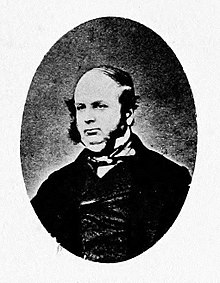Henry Thomas Buckle
| Henry Thomas Buckle | |
|---|---|

Henry Thomas Buckle
|
|
| Born |
24 November 1821 Lee, London, England, UK |
| Died | 29 May 1862 (aged 40) Damascus, Syria |
| Nationality | British |
| Occupation | Historian, chess player |
| Known for | History of Civilisation in England |
Henry Thomas Buckle (24 November 1821 – 29 May 1862) was an English historian, the author of an unfinished History of Civilization, and a strong amateur chess player. He is sometimes called "the Father of Scientific History".
Buckle, the son of Thomas Henry Buckle (1779–1840), a wealthy London merchant and shipowner, and his wife, Jane Middleton (d. 1859) of Yorkshire was born at Lee in London (Kent County) on November 24, 1821. He had two sisters. His father died in January 1840.
As a boy, Buckle's “delicate health” rendered him unsuited for the usual formal education or games of middle-class youth. However, he loved reading. This made him suitable to be “educated at home by his mother, to whom he was devoted until her death in 1859. She taught him to read the Bible, the Arabian Nights, Pilgrim's Progress, and Shakespeare. His father read theology and literature and occasionally recited Shakespeare to the family in the evenings.”
Buckle’s one year of formal education was in Gordon House School at age fourteen. When his father offered him a reward for winning a prize in mathematics, Buckle asked “to be taken away from school.” From then on he was self-taught. As such, Buckle said later, “I was never much tormented with what is called education, but allowed to pursue my own way undisturbed.... Whatever I may now be supposed to know I taught myself.”
At age nineteen, Buckle first gained distinction as a chess player. He was known as one of the best in the world. In matchplay he defeated Kieseritsky and Loewenthal.
Buckle's father died in 1840. Buckle inherited £20,000. This would be worth £1,613,000.00 in 2015. This inheritance allowed Buckle to live the rest of his life in reading, writing, and travel.
In July 1840 Buckle, his mother, and his sister Mary spent almost a year in Europe, with “extended stays in Germany, Italy, and France. Buckle studied the language, literature, and history of each place they visited.” Buckle taught himself to read eighteen foreign languages.
By 1840, Buckle had decided “to direct all his reading and to devote all his energies to the preparation of some great historical work.” During the next seventeen years he worked ten hours a day toward that purpose. By 1851 Buckle had decided that his “great historical work” would be “a history of civilization.” During the next six years, he was engaged “in writing and rewriting, altering and revising the first volume.” It was titled the History of Civilization in England and was published in June 1857.
Because he was uneasy about his health, Buckle “rose, worked, walked, dined, and retired with remarkable regularity”. His inheritance “enabled him to live comfortably”, but he spent money prudently with two exceptions: fine cigars and his collection of 22,000 books. Buckle and his mother enjoyed giving dinners for friends and dining out. Buckle was mostly deemed to be “a good conversationalist” because of his “deep knowledge of a wide range of subjects”. On the other hand, some thought him “tedious or egotistical” with a tendency “to dominate conversations”. He won the first British chess tournament in 1849.
...
Wikipedia
